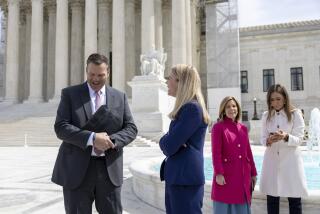Opinion: Why Roberts stuck with precedent in the abortion case

Commentators have been busy trying to discern what Chief Justice John G. Roberts Jr. was up to when he joined the Supreme Court’s four liberals Monday in striking down a Louisiana abortion law virtually identical to a Texas statute the court overturned in 2016.
Was he cynically voting to save the Republican Party from the political fallout of an anti-abortion ruling? Or maybe a concern for the court’s legitimacy led him to act hypocritically, genuflecting at the altar of precedent despite the fact that he himself has voted to overrule prior decisions such as a 2018 case in which the court reversed a
41-year-old precedent that allowed unions to collect “fair share fees” from non-members.
Or was Roberts signaling that he might be open to overruling Planned Parenthood vs. Casey, the 1992 decision that reaffirmed the “essential holding” of Roe vs. Wade. (Slate’s Mark Joseph Stern suggested that Roberts’ opinion weakened a standard the court had set in the 2016 Texas case for deciding when a restriction imposed an “undue burden” on the right to abortion.)
Whatever Roberts’ supposed ulterior motives, his decision can be explained by the fact that he wanted to keep his word.
At his confirmation hearings in 2005, Roberts told the Senate Judiciary Committee that overruling a precedent causes a “jolt” to the legal system.
Roberts was responding to a question from Sen. Arlen Specter of Pennsylvania, a pro-choice Republican. (Specter later switched to the Democratic Party.) Specter, who referred to Roe vs. Wade as a “super-duper” precedent, was satisfied enough by Roberts’ reply to vote for his confirmation, as did 22 Democratic senators.
The Louisiana law at stake in Monday’s decision, which required physicians performing abortions to have admitting privilege at a nearby hospital, was virtually identical to the Texas law the court struck down in a 2016 case called Whole Women’s Health vs. Hellerstedt.
Roberts dissented in that case and on Monday said that he still thought it was wrongly decided. But he went on: “The question today however is not whether Whole Woman’s Health was right or wrong, but whether to adhere to it in deciding the present case.”
He continued: “The legal doctrine of stare decisis requires us, absent special circumstances, to treat like cases alike. The Louisiana law imposes a burden on access to abortion just as severe as that imposed by the Texas law, for the same reasons. Therefore Louisiana’s law cannot stand under our precedents.”
It’s hard to imagine a bigger jolt to the legal system than a repudiation of a precedent that is only four years old involving essentially the same piece of legislation. Roberts would have looked ridiculous if he hadn’t voted as he did — and the court would have as well.
More to Read
A cure for the common opinion
Get thought-provoking perspectives with our weekly newsletter.
You may occasionally receive promotional content from the Los Angeles Times.











